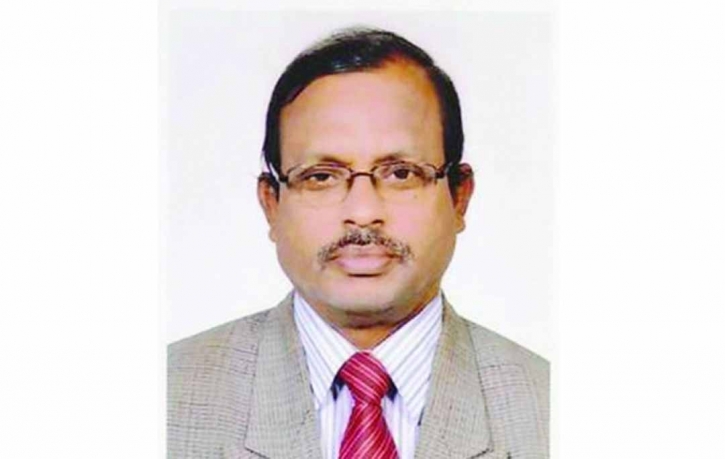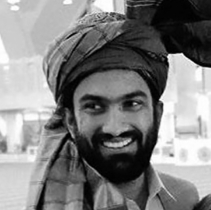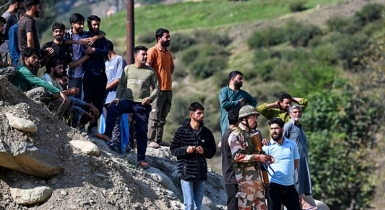
Since her return to the country on 17 May 1981 and after crossing many thorny paths Sheikh Hasina has been able to lead Bangladesh to the course of development with amazing success. On the other hand, due to communal policies and strong anti-Indian attitude,
the religious colony Pakistan is running towards paralysis with so many economic, political and social problems. Seeing this, some Pakistanis are admiring Bangladesh as the 'role model' in the developing world and regretting the disasterous situation of Pakistan! Admiring Bangladesh's development status by some Pakistanis is really insignificant compared to the genocide and crimes against humanity committed by Pakistani occupation forces against Bengalis in 1971. This is because the Pakistanis would not have done this if Bangladesh had not been able to surpass Pakistan in the direction of development! We got freedom under the leadership of Bangabandhu in exchange of lives of three million people, the dignity of nearly three and a half million mothers and sisters, the lives of thousands of Indian soldiers, and the genocide committed by Pakistan against the Bengalis and the crimes against humanity. Father of the Nation Bangabandhu was assassinated with his family-members on August 15, 1975, just when he was working on the reconstruction of war-torn Bangladesh. On November 3 of the same year, four national leaders Tajuddin Ahmed, Syed Nazrul Islam, Mansur Ali and A H M Kamruzzaman, were brutally killed in Dhaka Central Jail by the pro-Pakistani group inside Bangladesh. During the government of military ruler Ziaur Rahman, the leader of the pro-Pakistanis in Bangladesh, thousands of freedom fighters were hanged indiscriminately under his direction. Bangladesh is now a "role model of development" under the leadership of Bangabandhu's privileged daughter, Deshratna Sheikh Hasina.
Pakistanis who are now praising Bangladesh, are silent about the trial of genocide and crimes against humanity committed by their army in 1971 Bangladesh!
History also testifies that Pakistan Prime Minister Zulfikar Ali Bhutto did not recognize Bangladesh. At the same time he strongly opposed Bangladesh's membership in the United Nations. It should be noted that the current aggressive foreign minister of Pakistan Bilawal Bhutto Zardari (21 September 1988-) is the grandson of former President and Prime Minister of Pakistan Zulfikar Ali Bhutto and his wife Nusrat Bhutto. Bilwal Bhutto is also the son of former Prime Minister Benazir Bhutto and former President Asif Ali Zardari. However, in a press conference on 10 August 1972, the then Pakistani prime minister Zulfikar Ali Bhutto said that if Bangladesh believed that "they have some kind of veto over the release of our (Pakistani) prisoners, (then) we have a veto too." The veto that Zulfikar Bhutto spoke of is China's veto. Zulfikar Ali Bhutto then requested China to use its veto power to prevent Bangladesh from becoming a member of the United Nations. In response of Bhutto's call, Beijing first exercised its veto power in the Security Council on August 25, 1972 to block Bangladesh's membership. That Bangladesh is now moving forward under the leadership of Bangabandhu's daughter, JanaNetri Sheikh Hasina.
Standing on the above mentioned brief tragic background Bangladesh's development is legendary and wonderful. Besides the Pakistanis, many others now say that their South Asian neighbors-Sri Lanka and Pakistan-could learn from Bangladesh's remarkable economic development to overcome their economic crises. A recent feature story by John Rosario in the Sri Lanka-based Daily News is titled "Sri Lanka and Pakistan: Lessons from the Bangladesh Model". Bangladesh has achieved remarkable economic growth as it enters its fifty-two year of independence. This has made Bangladesh an emerging hub of regional connectivity, and trade and are attracting investment opportunities. According to the World Bank, Bangladesh is now one of the fastest growing economies in the world. These are the products of Bangladesh's non-communal policies and continuity of democracy under the leadership of Bangabandhu's daughter, Sheikh Hasina.
Pakistani columnist and sociologist Tasneem Siddiqui wrote a column titled 'Why We (Pakistanis) Lag Behind'. Tasneem Siddiqui said, "Most worrying is Pakistan's poor performance on social fronts: 25 million children are out of school; the continuing wide gender gap; low quality of education and employment; widespread shortage of routine immunization; world's worst infant mortality rate; rampant malnutrition and 40 percent of children are stunted. Pakistan's political leaders or intellectuals have no interest in these aspects.
In the last 20 years, Bangladesh's GDP per capita has grown by 500%, which is two and a half times that of Pakistan.
Bangladesh's infrastructure was destroyed by the Pakistani occupation forces in 1971. However, in the last 50 years, Bangladesh has now advanced much ahead of Pakistan. The Canada-based International Forum for Rights and Security (IFFRAS) has praised Bangladesh's ability to deal with economic challenges during the Covid-19 pandemic. It noted that the world economy is in the deep crisis since World War II and multilateralism and the international order are facing unprecedented challanges. These challenges have created considerable obstacles to the development of South Asia in economic and other fields.
How Bangladesh has become a "miracle story" of development and Pakistan a "disaster story" is described in "Bangladesh and Pakistan - Formerly One Nation, Today a World Apart" published by the IFFRAS.
This article mentioned that Bangladesh and Pakistan maintained very different perceptions about their respective "national interests" as the reason of their worlds apart.
Bangladesh sees its future in human development and economic growth. Growth of exports, reduction of unemployment, poverty alleviation, improvement of self-employment, reduction of dependence on credit and aid, and further expansion of micro-credit have been set as targets for Bangladesh.
On the other hand, human development does not carry much importance for Pakistan. 'Much of the national energy is focused on countering India or fostering anti-Indian and extra-nationalist leaders.'
Bangladesh's foreign exchange reserves reached a record $45.10 billion in May 2021 amid the Covid-19 pandemic, more than double Pakistan's $17.1 billion in June 2021.
IFFRAS noted that the real surprise lies in the fact that even in FY2020, when the economies of all countries around the world was compressed due to pandemic lockdowns, Bangladesh grew by 5.24%.
Noted economist Wahiduddin Mahmud called Bangladesh as "the next Asian tiger". Pakistani sociologist Tasnim Siddiqui quotes Bangladesh's astonishing development as saying, "This is the same country that the ruling class before 1971 thought was dragging down Pakistan's economic growth." Tasnim Siddiqui finally appealed to Pakistan's planners, policymakers and civil society leaders to watch and learn from this 'developmental wonder' of Bangladesh.
Pakistani Professor Dr. Munis Amar (2021) attributes Pakistan's dire circumstances to the "lack of proper leadership." In his words, "What is lacking on the part of Pakistan is a leadership which can make use of the available opportunities and resources to put its house in order and transform it into a vibrant state." Bangladesh is fortunate to have a people's leader Sheikh Hasina, as the country's prime minister. The religious colonial state of Pakistan is regretting seeing this 'wonderful progress' of Bangladesh because of Deshratna Sheikh Hasina, the privileged daughter of the Father of the Nation Bangabandhu Sheikh Mujibur Rahman!
Professor Dr. Arun Kumar Goswami, author of Institutionalization of Democracy in Bangladesh. Director, Center for South Asian Studies. Former Dean, Faculty of Social Sciences and Former Chairman, Department of Political Science, Jagannath University, Dhaka.





































